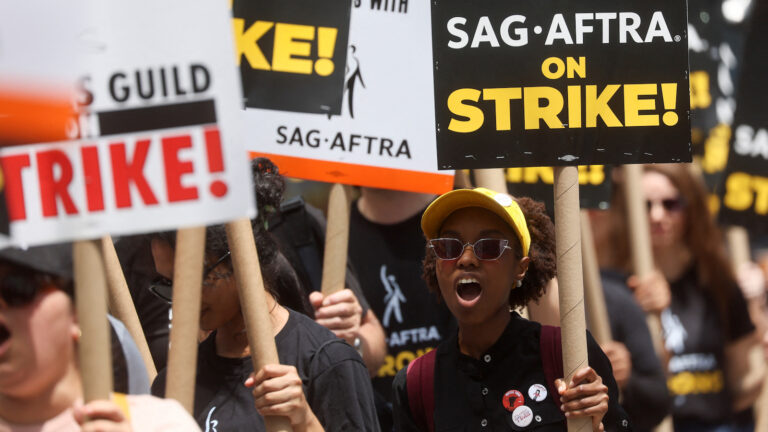If there’s one thing the strike by both the Screen Actors Guild and the Writers Guild of America makes clear, it’s that the commercial artist is going the way of the dinosaur—or, to be more accurate, the way of the silent film. Advancements in AI coupled with the profitability of streaming networks—the next ‘talkies’—leave actors and writers scrambling to keep up with the times.
The Screen Actors Guild (SAG-AFTRA) joined writers in Los Angeles in a strike against the Alliance of Motion Picture and Television Producers (AMPTP) for higher wages, better working conditions, additional pension benefits, and royalty-based issues. More importantly, the artists are protesting against the rise of AI and its adoption in television and film productions.
In all of this, they’re ignoring two essential truths: Studios are always looking to turn a profit, and you can’t strike for higher viewer ratings. Trying to force producers to concede to higher wages and additional retirement benefits completely neglects the larger market powers at play.
Just last year, streaming viewership surpassed cable TV for the first time at 34.8% compared to 34.4%. A meager difference but one that has been steadily rising over the years. According to projections, 101.5 million people will cancel their cable TV subscriptions by 2024. Two years after that, that number will rise to 112.9 million. That’s no drop in the bucket. Demanding more pay in an objectively waning industry is a foolish play. As advancements in CGI and AI allow studios to create larger, more grandiose pictures in less time, unionized actors and writers may want to rethink their bargaining strategy. If they’re not careful, the use of unionized actors who are contractually obligated to multiple breaks, well-regulated and increasing pay, and a variety of insurances will soon seem more like a burden than a blessing.
SAG-AFTRA has declared that its members are protesting the unregulated use of AI, which “threatens the very voices and likenesses that form the basis of professional acting careers.” They are also demanding increases in the benefit plans which members rely on for health care and a “dignified retirement,” as well as speaking out against the “burdensome and unreasonably demanding self-taped auditions” that actors have to produce day in and day out. Evidently, roping a roommate into pressing “record” for an at-home audition tape is just too strenuous.
The guild’s demands will do little good. While they may succeed in achieving higher wages and some protections against AI in the near future, there’s no telling how this will evolve in the coming years. Just because they have their jobs now, doesn’t mean a highly efficient (and cost effective) AI program won’t take their place in the future. Besides, radical changes have been made in the film and TV industries before and the world is still standing. Just look at the transition from silent films to talkies in the 1920s. Yes, many actors lost their jobs, but the ones who evolved, prospered. It’s almost as if they embraced new technology and respected market demands.
While the very real concern over illegal uses of actors’ likeness is merited, demanding that a producers’ group limit its use of AI is unrealistic to say the least. Even if they do somehow force producers to restrain their use of AI, it’ll do as much good as plugging a hole in a boat during a thunderstorm—water will inevitably get in.
In response to the strike, the AMPTP came out and proposed a ‘groundbreaking’ AI policy, which Duncan Crabtree-Ireland, the national executive director and chief negotiator for the Screen Actors Guild, was quick to attack: “They proposed that our background performers should be able to be scanned, get paid for one day’s pay, and their company should own that scan, their image, their likeness, and should be able to use it for the rest of eternity in any project they want with no consent and no compensation. So if you think that’s a groundbreaking proposal I suggest you think again.”
Crabtree-Ireland is forgetting that those background actors would have to consent to their image and likeness being used in projects. It’s not as if the producers are hiding information about image use—they’d be legally obligated to disclose that for transparency sake. If an extra doesn’t agree with a project’s use of their likeness, they can simply not work on that job, and the crew will find another SAG member to fill their shoes—or worse—cast a non-union actor.
Even if the union was successful in persuading the AMPTP to heavily stifle AI development in the industry, who’s to say that will save performers’ jobs?
As a bustling new industry, artificial intelligence will soon become a staple in our daily lives. From commercials, to homework helpers, and text chat-bots for the socially awkward, AI is here to stay, whether we like it or not. It’s only natural that studios will want to adopt the technology. If SAG-AFTRA succeeds in their wish to prevent AI development, they’ll soon be forced to watch as independent and foreign companies create bigger, better, more technologically advanced films, for cheaper.
Chat GPT has over 100 million users, and millions of people share AI generated content. There is no slowing down this technology. If union members go on strike after strike, demanding higher pay in a dying industry and calling for safeguards against an indomitable technology, the market will find other ways to make content quicker, easier and cheaper—even if that means not hiring live performers anymore. That scenario will be a little while ahead, but it is definitely coming.
When it does, these strikers shouldn’t be surprised. After all, they’re the ones that refused to adapt to the new ‘talkies.’ Looking ahead, they should all take President Biden’s thoughtful advice to displaced workers: “Learn to code.”














Add comment